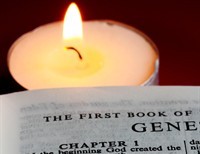Kneeling? Yep. Kneeling. I didn't like to kneel
In the last, "Analysis of a Conversion", I related how, when I was about 5 years old, my grandmother taught me about the power of the faith of a mustard seed. And how I completely missed the point.
In the conclusion of that article, I said that my grandmother didn't do anything wrong. That is what you are supposed to do, teach the little children. That's not the case this time.
Before I go on, I have to tell you something about my grandmother. She was tiny, all of 4' tall, but she was powerful. When I was 18 years old, she could lift me bodily. She had to do it, one day, because I had passed out from a fever.
And, she could kneel forever when she was praying. And she couldn't understand why others wouldn't do it. I don't think it ever occurred to her that they couldn't do it.
My grandmother was one of those grannies that always had a Rosary wrapped around her knuckles. She seemed to be in constant prayer. And she was a little Theologian. Many of the things she taught me, come back to me when I'm reading my Bible or the Catechism. She's the one who first said to me, "have the faith of a mustard see and you can do anything", "we are in this world to suffer", and "don't worry about tomorrow, tomorrow will take care of itself." I had no idea that these were lessons straight from Scripture. And they are principles by which I live my life today. But in that day and age, it was different. I had no idea what she was talking about.
The poor thing was always trying to organize Rosary prayers in the neighborhood. But when people got wind of it, they avoided her like the plague. Because she didn't broach slouching, standing or sitting from anyone less than 90 years old. Everyone had to kneel to pray.
So, the result was that she would go out in search of lost sheep to gather for prayer. But while she was searching for one, the rest would scatter. The only ones who would remain was her equally faithful sister and the grandson, when he didn't escape.
At that age, I couldn't sit still for very long. Much less kneel. The result was that prayer became a very unpleasant experience for me. Something to be avoided at all costs. And since I avoided prayer, I lost out on the graces which one accumulates with prayer. Thereby making it easier for me to fall away from the faith.
Now, my grandmother had the best of intentions, but she was a bit too zealous for the rest of the world. And, in my case, she expected a bit too much from a child of my age. But for every cloud, there is a silver lining.
Therefore, I believe that kneeling may have been one of the reasons why I fell away. But when I came back to the Faith, I was determined not to make the same mistakes that my own parents had made. So, whenever I pray, I invite my children and I am just happy that they join me, no matter what posture they prefer.
And I'm happy to announce that, thanks be to God, to my knowledge, my four children are still faithful Catholics. Some of them are over twenty years old, now.
But at that age, I was neither mentally nor spiritually ready to KNEEL and pray. I think I might have prayed if they had simply requested of me, one Hail Mary and an Our Father.
Whether I was spiritually ready is open to question. However, I can safely assume that most of the grownups were mentally and physically capable of kneeling and praying. But, few of them were spiritually ready, either. Its as though my grandmother were Jesus and she asked them, "can you not spend one hour with me?" And most of them said, "No." And scattered.
The lesson I draw from this, is that faith is not coerced. People are at all stages in their journey of faith. Some can happily and readily kneel to pray. But some are struggling even to sit nearby and listen to others pray.
So, let's not add to their burdens. Let's make prayer a pleasant and joyful experience for all concerned.
In the last, "Analysis of a Conversion", I related how, when I was about 5 years old, my grandmother taught me about the power of the faith of a mustard seed. And how I completely missed the point.
In the conclusion of that article, I said that my grandmother didn't do anything wrong. That is what you are supposed to do, teach the little children. That's not the case this time.
Before I go on, I have to tell you something about my grandmother. She was tiny, all of 4' tall, but she was powerful. When I was 18 years old, she could lift me bodily. She had to do it, one day, because I had passed out from a fever.
And, she could kneel forever when she was praying. And she couldn't understand why others wouldn't do it. I don't think it ever occurred to her that they couldn't do it.
My Grandmother
My grandmother was one of those grannies that always had a Rosary wrapped around her knuckles. She seemed to be in constant prayer. And she was a little Theologian. Many of the things she taught me, come back to me when I'm reading my Bible or the Catechism. She's the one who first said to me, "have the faith of a mustard see and you can do anything", "we are in this world to suffer", and "don't worry about tomorrow, tomorrow will take care of itself." I had no idea that these were lessons straight from Scripture. And they are principles by which I live my life today. But in that day and age, it was different. I had no idea what she was talking about.
The poor thing was always trying to organize Rosary prayers in the neighborhood. But when people got wind of it, they avoided her like the plague. Because she didn't broach slouching, standing or sitting from anyone less than 90 years old. Everyone had to kneel to pray.
So, the result was that she would go out in search of lost sheep to gather for prayer. But while she was searching for one, the rest would scatter. The only ones who would remain was her equally faithful sister and the grandson, when he didn't escape.
At that age, I couldn't sit still for very long. Much less kneel. The result was that prayer became a very unpleasant experience for me. Something to be avoided at all costs. And since I avoided prayer, I lost out on the graces which one accumulates with prayer. Thereby making it easier for me to fall away from the faith.
Now, my grandmother had the best of intentions, but she was a bit too zealous for the rest of the world. And, in my case, she expected a bit too much from a child of my age. But for every cloud, there is a silver lining.
Therefore, I believe that kneeling may have been one of the reasons why I fell away. But when I came back to the Faith, I was determined not to make the same mistakes that my own parents had made. So, whenever I pray, I invite my children and I am just happy that they join me, no matter what posture they prefer.
And I'm happy to announce that, thanks be to God, to my knowledge, my four children are still faithful Catholics. Some of them are over twenty years old, now.
What? Are you saying we shouldn't kneel to pray?
No, no, no. I kneel all the time now. Especially in the Mass.But at that age, I was neither mentally nor spiritually ready to KNEEL and pray. I think I might have prayed if they had simply requested of me, one Hail Mary and an Our Father.
Whether I was spiritually ready is open to question. However, I can safely assume that most of the grownups were mentally and physically capable of kneeling and praying. But, few of them were spiritually ready, either. Its as though my grandmother were Jesus and she asked them, "can you not spend one hour with me?" And most of them said, "No." And scattered.
Conclusion
The lesson I draw from this, is that faith is not coerced. People are at all stages in their journey of faith. Some can happily and readily kneel to pray. But some are struggling even to sit nearby and listen to others pray.
So, let's not add to their burdens. Let's make prayer a pleasant and joyful experience for all concerned.











